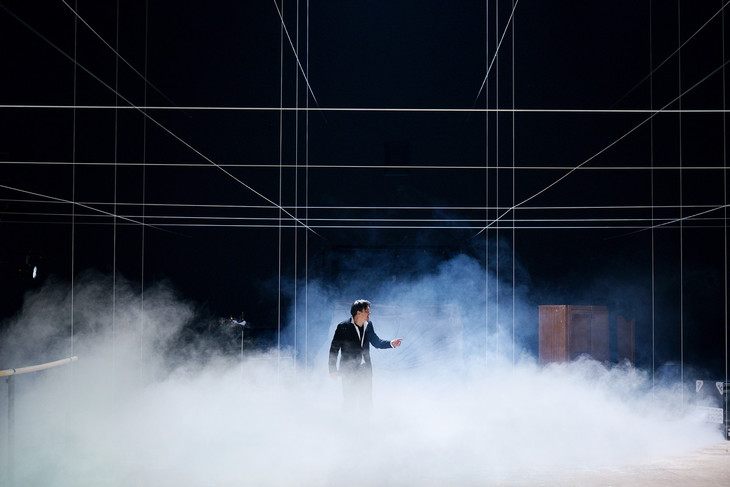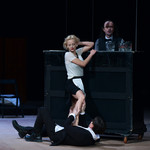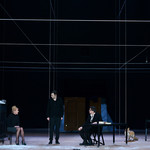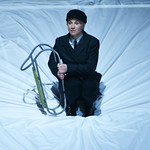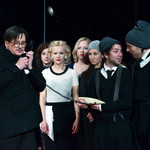Franz Kafka
The Castle
Slovene National Theatre Drama Ljubljana
Première 14. 2. 2015, Slovene National Theatre Drama Ljubljana
Running time 2 hours 50 minutes. One interval.
Original title Das Schloß
Original title of the adaptation Dvorac
Director Janusz Kica
Author of stage adaptation Goran Ferčec
Translator of stage adaptation Višnja Fičor
Dramaturg Mojca Kranjc
Set designers Numen + Ivana Jonke
Costume designer Bjanka Adžić Ursulov
Composer Kyrre Kvam
Language consultant Arko
Lighting designer Aljaž Zaletel
Cast
K. Branko Šturbej
Landlord, Landlord 2 Matija Rozman
Schwarzer, an under-castellan’s son, Galater Voice from the Receiver, Village Council Chairman, Momus, Klamm’s village secretary, Erlanger, Klamm’s first secretary Branko Jordan
Teacher, Barnabas, a messenger Saša Tabaković
Girl at Lasemann’s, Miss Gisa, the school mistress Petra Govc
Lasemann, a tanner, Barnabas’s Father, Bürgel, Friedrich’s secretary Zvone Hribar
Mrs Lasemann, Barnabas’s Mother, Mizzi, the chairman’s secretary Katja Levstik
Coachman Gorazd Logar
Artur Nik Škrlec AGRFT
Jeremias Rok Kravanja as guest
Pepi, a chambermaid/barmaid Vanja Plut
Pepi’s Friend, Hans Brunswick, a student Sabina Kogovšek
Amalia, Barnabas’s sister Iva Babić
Olga, Barnabas’s sister Barbara Cerar
Frieda Polona Juh
Landlady Zvezdana Mlakar
Franz Kafka! It is the writer’s name itself that triggers a wealth of associations matched by few authors of world literature. Furthermore, his name has become synonymous with a diversity of emotional states and conditions of modern humankind. His books are no easy reads and may require some effort to fully appreciate them. Although published a while ago, they remain perennially topical and part and parcel of our everyday culture and constantly elicit new interpretations. The Castle (written in 1922 and published in 1926) occupies a special position in Kafka’s relatively small body of work. The unfinished novel, which offers a multiplicity of meaning, is permeated by an ingenious dark atmosphere and tells a story of a land surveyor who comes to a snowed-in village at the foot of a castle. Ever since its publication, The Castle has been a source of identification for different historical situations, in both political and metaphysical contexts. This goes to show what an impossible (if not entirely unreasonable) task it is to comprehend it in its totality. Every attempt to render it in a different medium is doomed to be inadequate. What remains, therefore, is to engage with it in a partial, personal, and almost selfish enquiry, sustained by Kafka’s metaphors, which will allow for a reflection of our present moment. The hazardous journey of authorial interpretation has been undertaken by the director Janusz Kica and Goran Ferčec, the author of the stage adaptation. As a follow-up to Kica’s staging of America (1995) and The Trial (2001), The Castle imparts the Slovenian audience one of the paths to reach the writer who is grasped by everyone, but by no one exhaustively.

